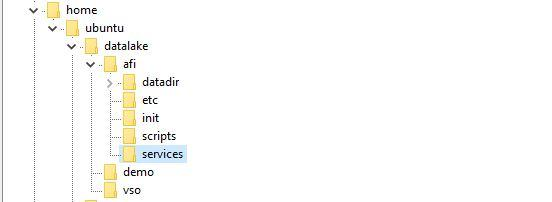Steps for creating Data pool:
...
datadir (should be empty)
etc
init
mkdir datadir
mkdir etc
mkdir init
2. Change directory to etc
...
Encountered Issues:
To re-start Docker
To check if the docker container is running, run the following command:
docker ps
<if no row returns → docker is down>
Path: /home/ubuntu/datalake/afi/scripts
Names of the container - afi, vso
Command to start docker:
docker restart <container name>
Once the docker is restarted, it is necessary to restart the sync service & enable the same (else the replication timer will not be scheduled).
The server location of service & timer is: /lib/systemd/system
sync_master_afi.service
sync_master_afi.timer
sync_master_vso.service
sync_master_vso.timer
Command to list the scheduled timers:
system$ sudo systemctl list-timers sync_master*
Command to check the status of the service & timer
systemctl status sync_master_afi.service
systemctl status sync_master_vso.service
systemctl status sync_master_afi.timer
systemctl status sync_master_vso.timer
To enable the service run following commands:
systemctl enable sync_master_afi.service
systemctl enable sync_master_vso.service
To enable the timer run the following commands:
systemctl enable sync_master_afi.timer
systemctl enable sync_master_vso.timer
2. If the datapool is out of sync with production:
Perform the following steps on Master Server that is to be replicated on the Datapool
1.Using Putty, connect to prod server. Change to root user.
sudo su
2. Restart mysql service
systemctl restart mysql
3. Login to mysql using root
mysql -u root -p
4. Run following commands:
RESET MASTER;
FLUSH TABLES WITH READ LOCK;
SHOW MASTER STATUS;
5. The status appears as below: Note that position number varies!
+------------------+----------+--------------+------------------+
| File | Position | Binlog_Do_DB | Binlog_Ignore_DB |
+------------------+----------+--------------+------------------+
| mysql-bin.000001 | 98 | your_DB | |
+------------------+----------+--------------+------------------+
6. Note down the master details - file name and log position(log pos)
7. Open a duplicate session and in this new session run the following command
mysqldump -u root -p openmrs > 1openmrs.sql
8. Switch back to the mysql session and run the following commands
unlock tables;
quit;
9. Transfer the file 1openmrs.sql file to the datapool server
Perform the following steps on Master Server that is to be replicated on the Datapool (In all the steps mentioned below, it is assumed that we are replicating the AFI docker container. For VSO or any other container make the necessary changes)
Stop the docker that is out of sync
docker stop afi
Remove the docker container
docker rm afi
The file structure maintained at datapool is:
Go to path - /home/ubuntu/datalake
Take the backup of the container folder that you want to replace on your local machine
delete the container folder from datalake folder
Now create a new directory for the conatainer
mkdir afi
Under this new folder create following 5 sub folders
mkdir datadir (it should be empty)
mkdir init
mkdir etc
mkdir scripts
mkdir services
Change directory to etc
cd etc
Create the file my.cnf
touch my.cnf
Edit the my.cnf file
vi my.cnf
To insert text press i
Add the following lines in the file:
[mysqld]
user=mysql
server-id=2
log-bin=mysql-bin
binlog-format=row
relay-log=mysql-relay
replicate-rewrite-db=openmrs->OpenMRS_AFI
replicate-do-db=OpenMRS_AFI
binlog-do-db=OpenMRS_AFI
Press esc, enter :wq, enter to save the file
Change directory to init
cd ../init
Copy the 1openmrs.sql file
Edit the 1openmrs.sql file as follows:
Add the following line as the first line in the file
USE <name_of_the_database_in_the_slave_mysql>;
i.e. USE OpenMRS_AFI;
Press esc, enter :wq, enter to save the file
Create 2setup_slave.sql file
touch 2setup_slave.sql
Add following lines to the sql file:
CHANGE MASTER TO MASTER_HOST='<master_ip_address>', MASTER_USER='<slave_user_created_on_the_master_mysql_server>', MASTER_PASSWORD='<slave_user_password>', MASTER_LOG_FILE='<master_log_file_name>', MASTER_LOG_POS=<master_log_pos>;
in case of afi the the above lines will be
CHANGE MASTER TO MASTER_HOST='13.127.240.201', MASTER_USER='dbslave', MASTER_PASSWORD='dbslave_afi', MASTER_LOG_FILE='mysql-bin.000001', MASTER_LOG_POS=<as noted in step#5>;
Press esc, enter :wq, enter to save the file
Under subfolder “Scripts”, copy the files from backup taken on local machine (under same subfolder) i.e. files viz. create_container.sh, mysql.sh & dbash.sh. Provide the necessary execution rights to the files.
Under subfolder “Services”, create 2 files viz. service.log & debug.txt using command:
touch service.log
touch debug.txt
Use docker to create the mysql server container that will have the above configurations with the following command:
docker run --name <container_name>
-e MYSQL_ROOT_PASSWORD=<root_password>
-e MYSQL_USER=<slave_user>
-e MYSQL_PASSWORD=<slave_user_password>
-e MYSQL_DATABASE=<database_name_that_will_be_populated_with_master_data>
--mount type=bind,source=<location_to_datadir>,target=/var/lib/mysql
--mount type=bind,source=<location_to_my.cnf>,target=/etc/my.cnf
--mount type=bind,source=<location_to_init>,target=/docker-entrypoint-initdb.d
-p <host_port_to_be_mapped>:3306
-d mysql/mysql-server:5.7In case of afi, the command will be:
docker run --name afi
-e MYSQL_ROOT_PASSWORD=i10hi1c_afi
-e MYSQL_USER=dbslave
-e MYSQL_PASSWORD=dbslave_afi
-e MYSQL_DATABASE=OpenMRS_AFI
--mount type=bind,source=/home/ubuntu/datalake/afi/datadir,target=/var/lib/mysql
--mount type=bind,source=/home/ubuntu/datalake/afi/etc/my.cnf,target=/etc/my.cnf
--mount type=bind,source=/home/ubuntu/datalake/afi/init,target=/docker-entrypoint-initdb.d
-p 3307:3306
-d mysql/mysql-server:5.7 &>> /home/ubuntu/datalake/afi/services/debug.txt
Check with the following command whether the container has been successfully created
docker logs <container_name> i.e. docker logs afi
Run the scripts in “Scripts” folder viz. dbash.sh & mysql.sh
Enable the sync master service & timer as described in Issue#1
Copy the shell scripts from backup (local machine) “Services” folder to “Services” folder in docker container folder i.e /home/ubuntu/datalake/afi
Provide necessary read/write/execute rights to the shell scripts
Login to Superset with admin login
Go to Sources → Databases.
Select the container newly created. Click on Edit record button.
Hit the “Test Connection” button to ensure that the DB connection is re-established.
Check if dashboard displays correct data
